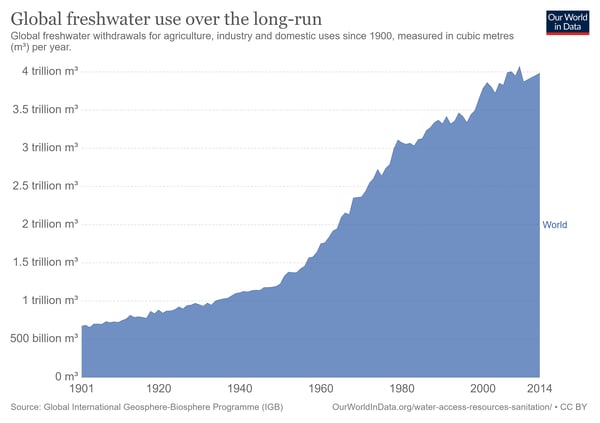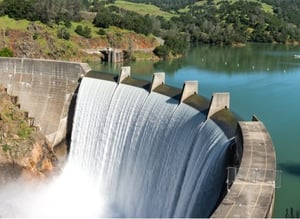.jpg)
In anticipation of World Water Day on March 22, we consider the sustainability of one of our most precious resources - Water.
Water is an essential, yet finite resource. Increasing populations and rapid urbanization exert an ever-increasing stress on the world's water resources. This poses a serious threat when it comes to ensuring water security for the future. Climate change impacts water resources first and foremost. Its impacts are channelled through the hydrological cycle and propelled by water through the economy, society, and the environment.
Water is the largest natural resource but only 3% of it is freshwater, of which just 1/3 is accessible for use in agriculture and cities. The rest is frozen in glaciers or hidden too deep underground. Today, the main water source for over 2 billion people are aquifers – underground stores of freshwater. Global water demand has increased by 600% over the past 100 years. Such an increase in global freshwater consumption has led to the depletion of over half of the world’s largest aquifers, and is a problem that will likely deteriorate as demand grows. At this pace, available freshwater reserves needed to ensure basic water, food, and energy security are predicted to drop by 40%.

Water connects sectors, from energy and forests to agriculture and urban development, and plays a critical role in both climate mitigation and adaptation. As the world becomes hotter, wetter, and drier due to climate change, water security has become a global priority. As many as 4 billion people already experience water stress at some point in the year. In 2017, natural disasters—most of them weather related, affected almost 100 million people and cost an estimated $335 billion dollars.
What is water sustainability?
 Sustainable water management means the ability to meet the water needs of the present without compromising the ability of future generations to do the same. Achieving sustainable water management requires a multidisciplinary and holistic approach in which technical, environmental, economic, landscape aesthetic, societal and cultural issues are addressed. On a global scale, having sustainable water means to provide each person on the planet with affordable access to the minimum 20 to 50 litres of daily water required to sustain life. This follows the United Nations General Assembly recognition of “the right to safe and cleaning drinking water and sanitation as a human right that is essential for the full enjoyment of life and all human rights”. Water sustainability also means effective and holistic management of water resources. There are now multiple demands on water resources, which drive the need for sustainable, integrated and holistic water management.
Sustainable water management means the ability to meet the water needs of the present without compromising the ability of future generations to do the same. Achieving sustainable water management requires a multidisciplinary and holistic approach in which technical, environmental, economic, landscape aesthetic, societal and cultural issues are addressed. On a global scale, having sustainable water means to provide each person on the planet with affordable access to the minimum 20 to 50 litres of daily water required to sustain life. This follows the United Nations General Assembly recognition of “the right to safe and cleaning drinking water and sanitation as a human right that is essential for the full enjoyment of life and all human rights”. Water sustainability also means effective and holistic management of water resources. There are now multiple demands on water resources, which drive the need for sustainable, integrated and holistic water management.
Sustainable water solutions
Sustainable water systems should provide adequate water quantity and appropriate water quality for a given need, without compromising the future ability to provide this capacity and quality, according to the. International Water Association (IWA). The following list from the IWA addresses how different water sources can be used sustainably:
- Surface water is limited as is unequally distributed around the world and pollution from various activities means that surface water without treatment is not suitable for drinking. If properly constructed, dams can provide a sustainable water supply as the structures can be used for power generation, irrigation, flood prevention, water diversion and navigation. However, large-scale dam projects may present challenges to sustainability: negative environmental impacts on wildlife habitats, fish migration, water flow and quality and socioeconomic impacts. Therefore, a sustainability impact assessment should be performed.
- Groundwater accounts for more than 50% of global freshwater and is critical for potable water. Groundwater can be a sustainable supply of water only if the amount of water entering, leaving and being stored in the system is conserved. Unsustainable groundwater use results in water-level decline, reduce streamflow and low quality water, directly impacting local communities.
- Desalination, in some nations lacking freshwater, has provided an adequate water supply for many years. However, higher energy demands from both thermal and membrane-based compared to groundwater and surface water treatment have challenged the adaption of desalination as a sustainable one. The sustainability of desalination could be improved if it is coupled with renewable energy. Decentralised, solar power desalination has been recommended as a way to provide more sustainable water for Greece’s 6000 islands.
- Reclaimed water, or water reuse as it is known, can also be a sustainable source for water supply and can alleviate stress on primary water resources, such as surface and groundwater. Depending on the given application, reclaimed water must be treated to provide an appropriate quality, for example for irrigation or industry use. The level of water reuse varies globally. Countries such as Spain and China continue to lead the way in water reuse, with the later accounting for 49 percent of capacity contracted between 2010 and 2017.
Securing Sustainable Water for All
The United Nations (UN) has outlined the following areas where sustainable water resources management will need to take place, which ties in with its overarching goal of “Securing Sustainable Water for All”:
Agriculture
Agriculture is by far the thirstiest consumer of water globally, accounting for 70 per cent of water withdrawals worldwide, although this figure varies considerably across countries. Rain-fed agriculture is the predominant agricultural production system around the world, and its current productivity is, on average, little more than half the potential obtainable under optimal agricultural management. By 2050, world agriculture will need to produce 60% more food globally, and 100 per cent more in developing countries.
Industry and energy
Together, industry and energy account for 20 per cent of water demand. More-developed countries have a much larger proportion of freshwater withdrawals for industry than less-developed countries, where agriculture dominates. Balancing the requirements of sustainability against the conventional view of industrial mass production creates several conundrums for industries. One of the biggest is globalisation and how to spread the benefits of industrialisation worldwide and without unsustainable impacts on water and other natural resources.
Domestic sector
Municipal water use accounts for 10 per cent of total water use. And yet, worldwide, an estimated 748 million people remain without access to an improved source of water, and 2.5 billion remain without access to improved sanitation.
Cities
 More than half the world already lives in urban areas, and by 2050, it is expected that more than two-thirds of the global population of nine billion will be living in cities. Furthermore, most of this growth will happen in developing countries, which have limited capacity to deal with this rapid change, and the growth will also lead to increase in the number of people living in slums, which often have very poor living conditions, including inadequate water and sanitation facilities. Therefore, the development of water resources for economic growth, social equity and environmental sustainability will be closely linked with the sustainable development of cities.
More than half the world already lives in urban areas, and by 2050, it is expected that more than two-thirds of the global population of nine billion will be living in cities. Furthermore, most of this growth will happen in developing countries, which have limited capacity to deal with this rapid change, and the growth will also lead to increase in the number of people living in slums, which often have very poor living conditions, including inadequate water and sanitation facilities. Therefore, the development of water resources for economic growth, social equity and environmental sustainability will be closely linked with the sustainable development of cities.
Ecosystems
Perhaps the most important challenge to sustainable development to have arisen in the last decades is the unfolding global ecological crisis that is becoming a barrier to further human development. From an ecological perspective, sustainable development efforts have not been successful. Global environmental degradation has reached a critical level with major ecosystems approaching thresholds that could trigger massive collapse. The growing understanding of global planetary boundaries, which must be respected to protect Earth’s life support systems, needs to be the very basis of the future sustainable development framework.
Did you know? (Facts provided by the UN)
- Over 1.7 billion people are currently living in river basins where water use exceeds recharge, leading to the desiccation of rivers, depletion of groundwater and the degradation of ecosystems and the services they provide.
- As countries develop and populations grow, global water demand (in terms of withdrawals) is projected to increase by 55% by 2050. Already by 2025, two thirds of the world’s population could be living in water-stressed countries if current consumption patterns continue.
- The economic loss from the inadequate delivery of water and sanitation was estimated to amount to 1.5 % of gross domestic product of the countries included in a WHO study on meeting the MDGs.
- According to some estimates, over 80% of wastewater is discharged without treatment.
- Water-related disasters are the most economically and socially destructive of all natural disasters. Since the original Rio Earth Summit in 1992 floods, droughts and storms have affected 4.2 billion people (95% of all people affected by disasters) and caused $US1.3 trillion of damage (63% of all damage).
Here at ASL, we understand the importance of water as a resource of our planet. As part of our One World initiative we have set targets regarding environmental sustainability and social responsibility. As a business we want to focus on using water sustainably in our different locations around the world, always keeping in mind the needs and the regulations of the areas that we have our offices in.
Furthermore, through training and communication we aim to change our people’s attitude towards water use and help them incorporate sustainability in their everyday lives. At the same time we work together with our clients and our suppliers to ensure the efficient use of water in all aspects of our operations, through open dialogue, communication and cooperation. Our activities include monitoring use of water, training, supply chain evaluation and others. In ASL we are fully committed to promoting sustainability and to being part of the change.
Discover more about our ONE WORLD initiative
#OneWorld #Water #Sustainability
Are you looking for innovative, sustainable marketing services support? Contact us to discover how ASL can help your marketing campaigns become more environmentally sustainable and socially responsible.







